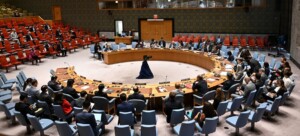‘Sudan lacks political will to implement HRs obligations’
Sudan’s failure to accept key recommendations made during its second Universal Periodic Review this year has confirmed the lack of political will to implement its obligations with regards to human rights, FIDH and ACJPS said in a report on Thursday.
Sudan’s failure to accept key recommendations made during the Universal Periodic Review (UPR) this year has confirmed the lack of political will to take concrete steps to implement its international legal obligations with regards to fundamental human rights, the International Federation for Human Rights (FIDH) and its member organisation, the African Centre for Justice and Peace Studies (ACJPS) said in a report on Thursday.
“Sadly, Sudan failed to accept many of the key recommendations made by Human Rights Council member states that simply correspond to its existing international legal obligations,” said Mossaad Mohamed Ali, ACJPS Executive Director. “Critical issues, such as the need to repeal laws that grant immunity from prosecution for officials, and to cease aerial bombardments of civilian areas, were side-stepped by the government delegation”.
FIDH and ACJPS state that during the review, “the government of Sudan failed to accept nine recommendations to reform Sudan’s notorious National Security Act of 2010 which grants the National Intelligence and Security Services (NISS) wide powers of arrest, search and seizure, allows detention for up to four and a half months without judicial review, permits incommunicado detention without prompt unequivocal access to a lawyer of one’s choice or the right to medical care, and grants immunity to officials.
“Sudan failed to accept similar recommendations made during its first UPR, and has failed to implement recommendations made by the UN Human Rights Committee and African Commission on Human and Peoples’ Rights to the same effect,” the FIDH/ACJPS report reads.
“Just one month ago the UN Human Rights Committee, monitoring Sudan’s commitments under the International Covenant on Civil and Political Rights (ICCPR), reminded Sudan for a second time to submit, without further delay, information on progress towards addressing this priority issue.
“Sudan failed to accept many of the key recommendations made by Human Rights Council member states that simply correspond to its existing international legal obligations.”
Despite a litany of disappointing rejections, Sudan did accept a number of important recommendations that should be pursued by UN Member States in their future engagements with Sudan. This included commitments to conduct independent inquiries into all violations of international humanitarian law and human rights violations, including extra-judicial executions and torture, and to bring the perpetrators to justice.
“It is unfortunately the case that many of the same commitments were made during the first review but were not implemented. This cannot be repeated” said Sheila Muwanga, FIDH Vice President.
“Unless the Human Rights Council takes stronger action in response to the continuing widespread and grave violations of human rights and humanitarian law in Sudan, it is unlikely that the situation in the country will improve. It is the Council’s responsibility to now uphold commitments made by Sudan and to hold Sudan accountable for breach of international human rights norms and standards.”
The UPR was created through the UN General Assembly on 15 March 2006 by resolution 60/251, which established the Human Rights Council itself. It is a cooperative process which, by October 2011, has reviewed the human rights records of all 193 UN Member States. The ultimate aim of the mechanism is to improve the human rights situation in all countries, and address human rights violations wherever they occur.
Read the full FIDH/ACJPS report here.











 and then
and then